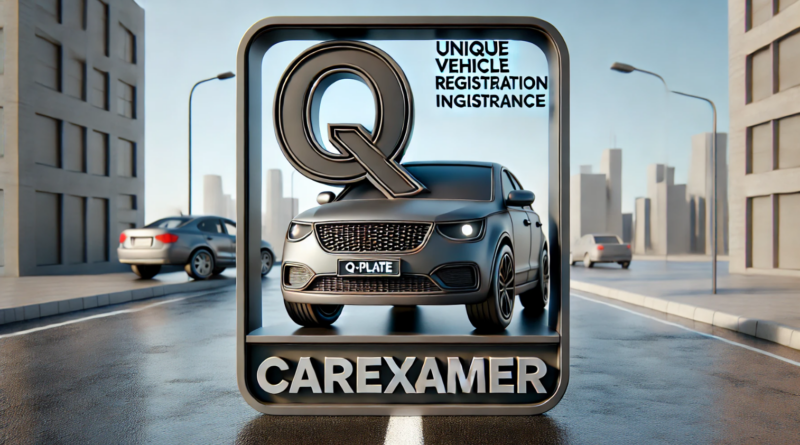What Are Q-Plates and Can You Insure a Q Plate Car?
Let’s break it down in simple terms so you can understand what Q-plates are and whether you can insure a Q-plate car You may have seen cars with a “Q” on the license plate and wondered, “What’s that about?” These are called Q-plates, and while they’re not super common, they come with a unique set of rules and quirks. If you’re thinking about buying a car with a Q-plate or already own one, you might be wondering what this means for you, especially when it comes to getting insurance.
So, What Exactly Is a Q-Plate?
A Q-plate is a special type of license plate issued by the Driver and Vehicle Licensing Agency (DVLA) in the UK. The “Q” is used when the vehicle’s age or identity is unclear or questionable. Think of it as a way for the authorities to say, “We’re not 100% sure when this car was made or where all its parts came from.”
You’ll often see Q-plates on vehicles that:
- Have been rebuilt or heavily modified: When a car is significantly altered or built from various parts, it can lose its original identity, making it hard to determine its true age.
- Have been imported without proper documentation: If a car comes from another country and there’s no paperwork to verify its age or origin, it could be issued a Q-plate.
- Were recovered after theft: Sometimes when a stolen car is found, parts like the Vehicle Identification Number (VIN) may have been tampered with, so the car gets a Q-plate.
- Are kit cars: These are cars built from different parts, often by enthusiasts, and they usually get Q-plates because they don’t fit the standard registration process.
How Does a Q-Plate Affect a Car?
Having a Q-plate impacts your vehicle in a few ways:
- Resale Value: Cars with Q-plates tend to have lower resale value. This is because buyers are often hesitant about cars with unclear histories—they may worry about whether the car has been rebuilt properly or if it’s safe to drive.
- Stricter MOT Tests: Vehicles with Q-plates have tougher Ministry of Transport (MOT) requirements. While regular cars are tested against the emissions standards of the year they were made, Q-plate cars are held to modern standards, which can make passing the test a bit trickier.
- Parts and Repairs: Since Q-plate cars often contain parts from different vehicles, finding the right parts for repairs can sometimes be challenging and more expensive than for standard cars.
Can You Insure a Q-Plate Car?
The short answer is yes, you can insure a Q-plate car. But, it’s not as straightforward as insuring a regular vehicle. Here’s what you need to know:
- Specialist Insurers: Not all insurance companies are willing to cover Q-plate cars. Because of their unique nature, you may need to seek out insurers that specialize in covering kit cars, imports, or heavily modified vehicles.
- Higher Premiums: Be prepared for the possibility of higher premiums. Since Q-plate cars have unknown histories and can sometimes be seen as higher-risk (due to modifications or difficulty in finding parts), insurers may charge more to cover them.
- Agreed Value Policies: One option to consider is an agreed value policy, which is especially useful for kit cars or modified vehicles. This means you and the insurer agree on the car’s value upfront, making it easier to settle on a payout if you ever need to file a claim.
- Modified Car Insurance: If your Q-plate car has been significantly altered or built from various parts, you’ll likely need modified car insurance. These policies are designed to cover cars that don’t follow standard specifications.
How to Get Insurance for a Q-Plate Car
Here’s how to go about insuring your Q-plate car:
- Collect All the Info: Gather as much information as you can about the car—especially if it’s been modified or built from different parts. The more details you can provide, the easier it will be to get the right insurance.
- Shop Around: Don’t settle for the first quote you get. Since Q-plate cars are a bit unusual, some insurers will offer better deals than others. Look for specialist insurance companies that have experience with modified or kit cars.
- Consider Agreed Value: If the car’s value isn’t easy to pin down, consider opting for an agreed value policy. This will give you and your insurer a clear understanding of what the car is worth, avoiding any surprises later on.
- Check the Fine Print: Make sure the policy covers everything you need, especially if the car has unique or hard-to-replace parts. Some policies might have exclusions for certain modifications, so read the details carefully.
Do Q-Plates Impact Insurance Costs?
Yes, having a Q-plate can impact your insurance costs. Since Q-plate vehicles have uncertain histories, potential modification risks, and sometimes difficult-to-find parts, insurers may see them as more of a liability. This can lead to higher premiums. However, there are ways to keep the costs down, like providing accurate details about the car, maintaining a clean driving record, and shopping around for the best deal.
The Bottom Line on Q-Plates
Q-plates might seem mysterious, but they serve a purpose for vehicles with unclear histories or major modifications. If you own a Q-plate car or are thinking of buying one, rest assured—you can still get it insured, although it might take a bit more effort than with a standard vehicle. Just make sure to do your research, look for specialist insurers, and consider options like agreed value policies to get the best coverage.
Buying a used VW. Buying used vauxhall, BMW, Jaguar, Ford, Volvo, Range rover, Bentley, Aston Martin, Porsche, Ferrari, Lamborghini, Maserati, Hyundai, Tesla, Honda, Pagani

